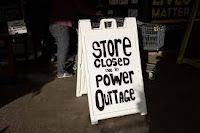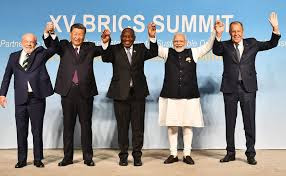Governments
don’t do things, people do things. I don’t know who said this, but I’m sure
someone did. Unless it’s too obvious to be worth saying. Government may set
policy, even provide guidelines and money, but eventually someone has to act on
those. The success or otherwise of an initiative depends very much on how
competent that person is and how committed they are to the initiative.
Let’s take two examples from South Africa. Up until a few months before the elections in May this year, South Africa was suffering from fifteen years of electric power problems culminating in rolling scheduled daily blackouts called loadshedding.
Eventually, with the national elections looming and the government watching its support shrink at pretty much the same rate as the electricity, the president set up a new ministry and appointed a new minister. Bypassing party structures, loyalties, and even financial considerations, the president appointed an extremely competent person and gave him a free hand. Dr Kgosientsho Ramokgopa is a civil engineer with two MBA-type degrees and a doctorate, and he has serious experience to boot.
 |
| Dr Ramokgopa |
Queues at Home Affairs
After the
election, the ANC had to take other parties on board to build a majority. That
required handing over some ministries. It was the first time the erstwhile
official opposition had been in the national government, and they were given the
important Home Affairs ministry among others. Home Affairs deals with matters
like citizenship, residence permits etc. It was a poisoned chalice of
inefficiency. It had a backlog of about 250,000 cases open cases. However, the
new minister was competent and motivated. This was a make or break assignment. He
looked at the system and changed it, stepped hard on corruption, and expected
everyone to work as hard as he did. After three months there was no backlog.
By
contrast, the previous president Jacob Zuma was only interested in what he
could personally get out of the job. Ministries were filled with yes-people who
were rewarded with riches. He demanded absolute loyalty for the money and
generally got it. The civil service took their lead from the top. The center
could not hold.
The moral of
all this is that the choice of the person heading an important instrumentality
is crucial to its success. Competent governors appoint competent and respected people
with expertise in the operation that they are required to guide. Despots,
however, don't do that. Their interest is to stay in power so the key
requirement they have of their ministers is loyalty. Competence may even be a disadvantage because the incumbent may
be diverted to achieving the aims of his portfolio at the expense of the
required absolute loyalty. We saw a suite of examples in the previous Trump
administration when he tried to appoint some competent people to important
portfolios. They didn’t last very long.
I think
Trump 2.0 has learned the lesson that loyalty is critical; the rest is
optional. For example, Matt Gaetz is a perfect choice for Attorney General. He’s
a lawyer, available since he was forced to resign his seat in the House ahead of the bipartisan report on his "extramural" activities, and clearly has no
other possibilities of employment. There’s no doubt that he’ll be completely
loyal and focus on getting rid of any residual cases directed at the president
elect by getting rid of the people concerned. Another appointment along the
same lines is Linda McMahon as Education Secretary. The president elect wants the department
gone. What better person than a specialist in TV wrestling for a wrecking ball?
The
Treasury Secretary post is still open. The requirements are enthusiasm for tariffs
and the false belief that the exporting country pays the tariffs. Some
experience with money (preferably legal) will be helpful, but one mustn’t be
too picky. Loyalty is the big thing. We await developments.
Abroad, and especially in Israel, Taiwan, and Ukraine, the question is how the new US administration will affect them. For mineral producers like South Africa and Australia, the threat to the world economy posed by punitive tariffs is a huge concern. In addition, South Africa has aligned itself with the BRICS group, which includes such players as Russia, China, Iran. It has also aligned itself with the Palestinian refugees. That amounts to disloyalty…


















Please stop, Michael, you're killing me. :-) There's no escape, just the willingness to stand tall and dare the hurricane to blow you over. My roots are deep.
ReplyDeleteWell, an immediate effect of the blog is that Matt Gaetz has now withdrawn his candidacy for Attorney General! However, there are others...
ReplyDeleteIn our own little way, are are contributing to the nonsense. Our new electric buses don't do well in cold weather, the batteries run out. So they are charged up by a diesel generator.
ReplyDeleteMr. Musk doesn't advertise the fact that it takes seven years for a Tesla to be as "green" as an ordinary petrol car. (After that it's much better. As long as you're not using a diesel generator to charge its battery...)
ReplyDeleteThank you for this, Michael. I love that you always give me a broader context in your posts.
ReplyDelete